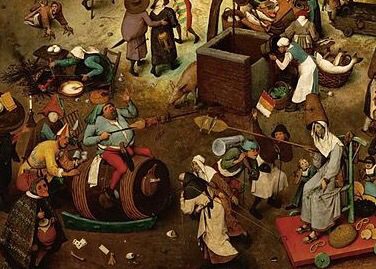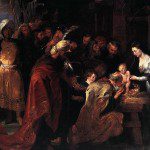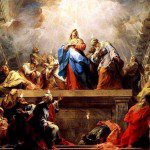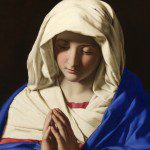
If I could be granted one vast and naïve wish, it would be that the pagan world would stop taking our holidays and perverting their meaning.
They do it with Christmas and Easter; they do it with Halloween; God knows they do it with Mardi Gras.
I say: Let them invent their own days, and eat their own cakes, and drink their own ale.
FEASTS ARE BOUGHT WITH FASTS
The word “holiday” is a kind of contraction; it comes from the Old English hæligdæg, or “holy day.” Is this a holiday or a holy day? we ask of some day perverted out of its true meaning; as though they were two, as though we could turn secular a day that is meant to be a reprieve from the secular. Joy and celebration and feasting, rightly understood, are holy: They give us a foretaste of heaven and remind us of our true longing. They tell us of a world to come where every day will be holiday. But we treat holiness as though it were a dour thing, and then call holiday something different.
Thus the division of souls from God begins with the division of words from meaning. Perchance it would help to start pronouncing “holiday” the way we pronounce “holiness.”
Now, what Mardi Gras reminds us is that feasts must be bought with fast; we are still here, and not yet there. Rightly understood, Mardi Gras is the day when families use up all eggs, fats, and butter in the home in preparation for Lent. The idea is, one does not want those materials to spoil and go to waste. That’s not really gluttony; that’s thrift. You get fat, or gras, not for the sake of fatness but to get rid of all that tempts discipline of will.
Mardi Gras does not mean, go, and get all the sin out of your system; which, in the practical reality of pagan culture, gets transformed into, go, and use this day as an excuse for the debauchery you engage in anyway. The day does not mean, do your sin in public today, for tomorrow you will do it in private.
It is right, at the end of seasons of joy and feast (Christmas and Epiphany) to indulge in some last harmless, sinless joy. In Heaven is perpetual joy, not perpetual sin. (They are opposites.) There is no Mardi Gras in Heaven only because there is no Ash Wednesday and no Lent, not because there is no fun. There is joy in heaven because there is no sin.
We have Mardi Gras here because there is sin, and we need Lent; and so it is also the day, in addition to the last feast for forty, when—if you had not yet made a recent confession—you did so. The joy and celebration and feasting on Mardi Gras are always tempered by a spirit of penance. If you may call it such, you may call it a somber feast, and eat your meat with a bitter belly. Tomorrow is Ash Wednesday.
GRAS OR SHRIVEN?
It would be better if we had not relied on the depraved French to name this holiday for us, but instead on the practical English.
The English name for Mardi Gras is Shrovetide. (Not “Fat Tuesday” but “Shrove Tuesday.”) To “shrive” means, either, “to confess,” or, “to absolve.” It is one of those old words which ought to come back into use. (But not so much that it gets corrupted too.)
“Mardi Gras,” as it hath been corrupted by wicked men, signifieth getting oneself gras, not on cakes and ale, but on sin. But “Shrovetide” remindeth the soul of man of the need to be shriven. To shrive and be shriven is to have joy. Later. First one must contemplate the depth of sin, and its cost to God. That should take at least forty days, once a year.
But speaking of words and their meanings, did you know that the word “carnival” comes from the Latin carnis, meaning meat? Carnival is no more than the time when we eat meat as an outward sign of our joy of spirit.
How words get wrenched and twisted and strangled is a source of endless perplexity to me.
A BRUEGEL
But none of this is new under the sun. Here is a painting from 450 years ago, showing the exact same tension between Shrovetide and Lent.
On the left of the painting is an inn; on the right, a church. Near the church are well-behaved children; near the inn, men drunk on beer. Prominent in the front, and just slightly toward the left, a fat man (Carnival) rides a beer barrel with a pork chop attached to the front. On his head he wears a meat pie. Immediately in front of him (and to our right) Christ (Lent) wears a purple robe and a bucket in place of a crown of thorns. In his right hand, Christ extends two pieces of fish.
Which side are you on: the side of the fat man besotted with beer and full with meat; or the side of the wounded Christ about to be crucified and eating a spare meal?
A SATIRE ON PROTESTANTS
In early modern Europe, as part of Shrovetide celebrations, a battle was enacted between two figures, the one representing Carnival, the other Lent: a battle between the flesh (carnis) and the spirit. In part, Brueggel is depicting one such battle.
But some critics also view the painting as a satire on the religious controversies of the day between Protestants and Catholics. Calvinists and Lutherans had abolished the observance of Lent, believing it to contribute to a theology of works (since almsgiving is a traditional part of one’s Lenten discipline). The “Carnival” figures in the painting are Protestants; the “Lent” are Catholics.
Brueggel, in other words, satirizes Protestants for acting as though they can have perpetual Carnival, and no Lent: grace without works, feasting without fasting. Once that theological error creeps in, the sled goes downhill and crashes into the wreck of pagan indulgence.
BETWEEN CARNIVAL AND CONFESSIONAL
In truth it is a false dichotomy, the fight between Mardi Gras and Lent; only in Heaven is there Mardi Gras without Lent, only in Hell Lent without Easter. Here, caught between the two worlds, we must buy feast at the price of fast, and temper joy with sorrow. Between Mardi Gras and Lent, carnival and confessional, neither must have the upper hand.
For myself, as I do this day every year (or I try), I indulge with some steak and baked potato, and finish the last of the beer. And then I pray and prepare for ash and a season of shriving.
***
If you like the content on this blog, your generous gift to the author helps to keep it active. I remember all my supporters in my Mass intentions each week.











